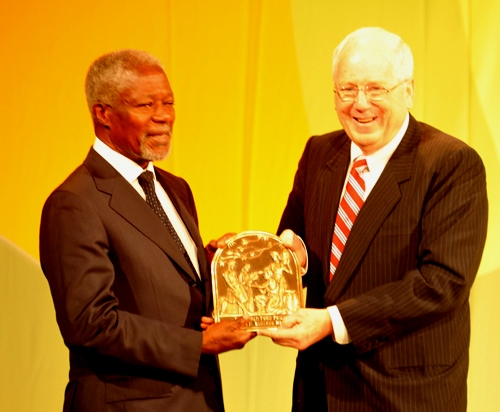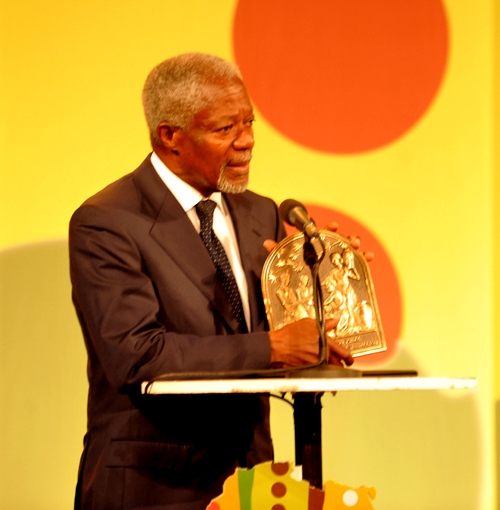Search
Norman E. Borlaug Medallion presented to former UN Secretary-General Kofi Annan for his international leadership and bringing attention to the issue of global food security.
 |
| Kofi Annan is presented with the Borlaug Medallion from Amb. Kenneth Quinn, president of the World Food Prize Foundation, during the first ever African Green Revolution Forum in Ghana. |
 |
| Kofi Annan addresses the crowd at the AGRF after receiving the Borlaug Medallion. |
Accra, Ghana, September 2, 2010 – The World Food Prize Foundation presented its Norman E. Borlaug Medallion to Kofi Annan on Thursday, Sept. 2, 2010, during the first-ever African Green Revolution Forum (AGRF) in his home country of Ghana. The Medallion is presented to world leaders whose actions have benefited mankind but who would not normally be eligible for the World Food Prize.
The award is in recognition of Annan’s international leadership as Secretary-General of the United Nations and as chairman of the board for the Alliance for a Green Revolution in Africa. In both roles, Annan has brought significant attention to the issue of global food security, most notably in establishing the UN Millennium Development Goals during his time at the United Nations.
“Over the past decade, no one has done more than Kofi Annan to bring attention to the critical issue of global food security around the world nor in fulfilling Norman Borlaug's dream of bringing the Green Revolution to Africa," said Ambassador Kenneth M. Quinn, president of the World Food Prize Foundation. The World Food Prize Foundation was founded by the late Dr. Norman Borlaug, a Nobel Peace Prize Winner who has been called the “father of the Green Revolution” for his breakthroughs in wheat production that helped save over a billion lives, and who had a passion for ending hunger in Africa.
“It is a great honor to receive this award in my home country of Ghana, which is making great strides in putting farmers and agriculture at the center of our development,” said Annan, who received a standing ovation from over 600 people in the audience. “Public and private partners are working closely together to transform Africa’s agriculture to benefit smallholder farmers and increase food security and nutrition in Ghana and across the continent.”
“We have left farmers to sink or swim without help for far too long,” Annan said. “After decades of neglect, agriculture has returned to the development agenda. Now it is time to bring together the many players – from farmers to CEOs – to achieve rapid, large-scale results that will put an end to hunger and poverty.”
Kofi Annan served as UN Secretary-General from 1997 to 2006. As Secretary-General, he was instrumental in laying out the Millennium Development Goals, a strategy to meet the needs of the world's poorest by 2015. One of the eight identified goals is to "eradicate extreme poverty and hunger." One of the specific targets the UN hopes to meet is to "halve, between 1990 and 2015, the proportion of people who suffer from hunger." In 2001, Kofi Annan and the United Nations received the Nobel Peace Prize for these and other efforts.
Annan is currently the chairman of the board of the Alliance for a Green Revolution in Africa (AGRA). AGRA works to achieve a food secure and prosperous Africa through the promotion of rapid, sustainable agricultural growth based on smallholder farmers. Smallholders--the majority women--produce most of Africa's food. AGRA aims to ensure that smallholders have what they need to succeed: good seeds and healthy soils; access to markets, information, financing, storage and transport; and policies that provide them with comprehensive support. Through developing Africa's high-potential breadbasket areas, while also boosting farm productivity across more challenging environments, AGRA works to transform smallholder agriculture into a highly productive, efficient, sustainable and competitive system, and do so while protecting the environment.
This year, the World Food Prize’s annual international symposium will focus specifically on “Taking it to the Farmer: Reaching the World’s Smallholders” during a week of events, October 12-16, in Des Moines, Iowa. During that week of events, the World Food Prize will also be awarded; this year’s honorees are David Beckmann, president of Bread for the World, and Jo Luck, president of Heifer International.
Quinn presented the medallion to Annan at Thursday's AGRF opening session. On Friday, Quinn will also lead a conference session at the AGRF that focuses on the work of Dr. Borlaug, and a panel of speakers will also discuss the ongoing progress of bringing the next Green Revolution to Africa.
The World Food Prize was founded nearly 25 years ago by Norman Borlaug to recognize and encourage achievements around the globe in food and agriculture. It is awarded annually. Learn more about the World Food Prize here.
The Norman E. Borlaug Medallion was created to recognize world leaders whose actions have benefited mankind but who would not normally be considered for the World Food Prize, which is primarily awarded to science, policy, and development experts for a specific, exceptionally significant, individual achievement along the full range of the food production and distribution chain. The Norman E. Borlaug Medallion has only been awarded to two other people: Yohei Sasakawa and the Nippon Foundation of Japan earlier this year, and His Majesty King Bhumibol Adulyadej of Thailand in 2007.
Dr. Norman Borlaug won the Nobel Peace Prize in 1970 for a lifetime of work to feed a hungry world, specifically for his achievements developing wheat new varieties to fight famine around the globe. He started the World Food Prize in 1986 to recognize and inspire others to work toward the same mission; the prize honors outstanding individuals who have made vital contributions to improving the quality, quantity or availability of food throughout the world. Laureates have been recognized from Bangladesh, Brazil, China, Cuba, Denmark, Ethiopia, India, Mexico, Sierra Leone, Switzerland, the United Kingdom, the United Nations and the United States. In 1990, Des Moines businessman and philanthropist John Ruan assumed sponsorship of The Prize and established The World Food Prize Foundation, located in Des Moines, Iowa, USA.
Amb. Kenneth M. Quinn has been president of the World Food Prize Foundation since 2000, following a 32-year career in the U.S. Diplomatic Service. Inspired by the vision of Dr. Norman Borlaug, Quinn has endeavored to build the annual award into “the Nobel Prize for Food and Agriculture.”
World Food Prize laureates joining Quinn at the AGRF will include Gebisa Ejeta, 2009 laureate and a distinguished professor of agronomy at Purdue University; Monty Jones, 2004 laureate and executive director and head of mission for the Forum for Agricultural Research in Africa; and Catherine Bertini, 2003 laureate and cochair of the Chicago Council’s Global Agricultural Development Initiative.
The African Green Revolution Forum (AGRF) focuses on promoting investments and policy support for driving agricultural productivity and income growth for African farmers in an environmentally sustainable way. Learn more at http://agrforum.com.
# # # #


